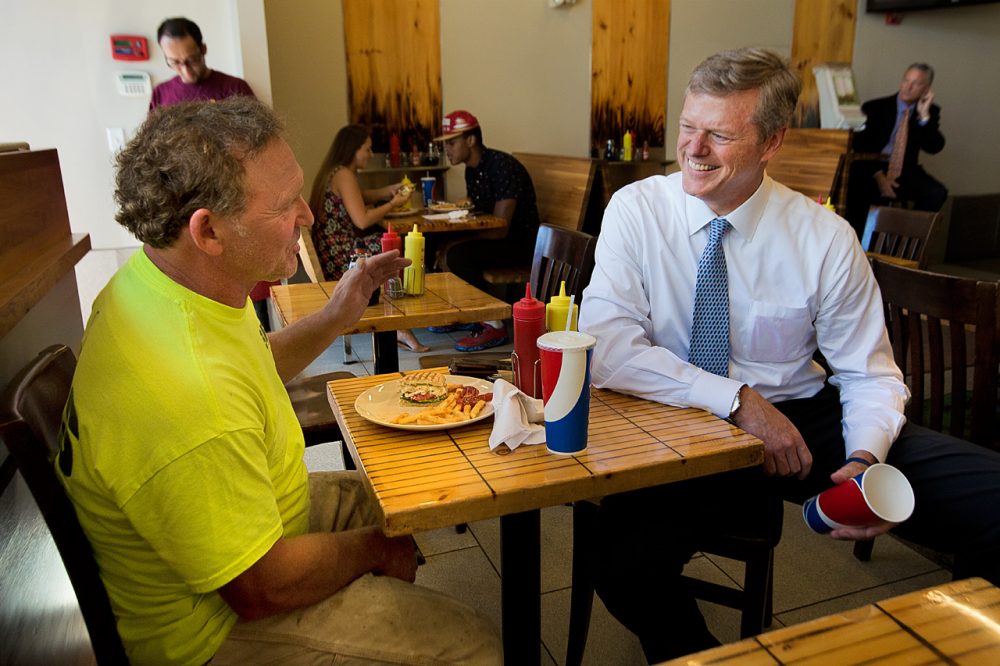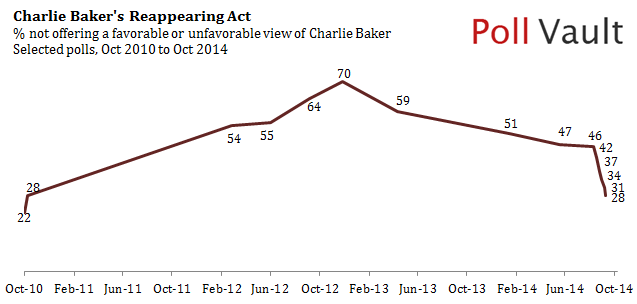Advertisement
The Reinvention Of Charlie Baker

As Republican gubernatorial candidate Charlie Baker has surged into a dead heat with Democrat Martha Coakley, much analysis has focused on the differences between his campaign this year and the one he ran against Gov. Deval Patrick in 2010. Analysts have made note of Baker's shift from a more conservative, angrier tone to a softer, more affable demeanor and a focus on managing government better. And Democrats have attacked him for changing his position on several policy issues since the last go-round.
But the polling suggests that the key to Charlie Baker's reinvention may be that many voters simply don't remember Baker from the first time around. As they say about re-runs on TV: If you didn't see it the first time, then it's new to you.
After a rough and tumble 2010 campaign for governor, Baker fell off the face of the political earth. Or so it seemed, looking at how thoroughly voters forgot about him. For a candidate who came within single digits of the corner office, Baker suffered a rapid and nearly complete descent into obscurity. A WBUR poll conducted in late 2012 found that 70 percent of registered voters either could not offer an opinion of Baker or said they had never heard of him.

But this period out of the spotlight seems to be helping Baker now, as it has given him what amounts to a blank slate with voters in this election cycle. And so far, voters seem to be responding. Our most recent WBUR tracking poll from this cycle found 47 percent of likely voters with a favorable opinion of Baker and only 22 percent with an unfavorable view. This a far cry from a September 2010 Suffolk University poll, which found just 36 percent of likely voters held a favorable opinion of Baker, equal to the 36 percent who viewed him unfavorably.
Baker also seems to be benefiting from some Democrats’ fuzzy memories. In the 2012 WBUR poll, more Democrats had forgotten who Charlie Baker was than independents or Republicans. Just 20 percent of Democrats had either a favorable or unfavorable view of Baker. This is all the more remarkable considering that by the end of the 2010 cycle, 56 percent of Democrats had an unfavorable opinion of him. It's as if Democrats couldn't name the villain from a hit movie they had all seen just two years earlier.
By fading into anonymity, Baker seems to have shaken any negative associations Democrats had of him from 2010. According to both the most recent WBUR tracking poll and a new Suffolk University poll, 20 percent of registered Democrats currently plan to vote for him. A Republican drawing Democratic support is not unusual in Massachusetts; Scott Brown drew 14 percent of registered Democrats in late polling against Elizabeth Warren, and Charlie Baker drew 14 percent of registered Democrats in 2010. But the distance between 14 percent support and 20 percent support among Democrats adds up to about 2.2 points difference in the general election, which could make the difference in a tight race. Another 11 percent of Democrats remain undecided, meaning this margin could move even further.
Assembling a winning coalition for a Massachusetts Republican in recent years has been a bit like cooking dinner blindfolded in someone else's kitchen: Grab everything you can and throw it in the pot, no matter how unrelated, in whatever quantities you can grab. Stir it with whatever tool you can reach. And cook it until you run out of time.
Advertisement
Republicans have not been able to rely upon big margins in cities, as Warren could, or the superior ground game crafted by Deval Patrick and his campaign manager, John Walsh. For Republicans, the ingredients come from hither and yon and are all stirred up into a strange sort of goulash. Sometimes, the dish comes out well, like it did for Scott Brown in 2010. But more often, it doesn't, as for Gabriel Gomez in 2013, or in Brown's second run in 2012.
Crossover Democrats are one part of the eclectic stew that Baker is cooking up this time. The gender dynamics of this race are also different than in previous years. Men are breaking for Baker by as much or more than women are for Coakley, according to many of the polls released this week. Baker is running ads aimed at women too, and has whittled away at his 24-point gap with women that sank his 2010 bid. At the end of that campaign, women were more likely to hold an unfavorable view (46 percent) than a favorable view (27 percent) of Baker. Today, those numbers have flipped. Baker is also actively courting votes in cities, to help tamp down massive Democratic margins in urban areas in past elections. None of these things are ordinary, and convey the sense the Baker campaign knows they need every ingredient they can reach.
All of this seems to have been enabled by the disappearing act Baker pulled after losing in 2010. If things continue along these lines, voters forgetting who Charlie Baker was may end up being the best thing that ever happened to him.